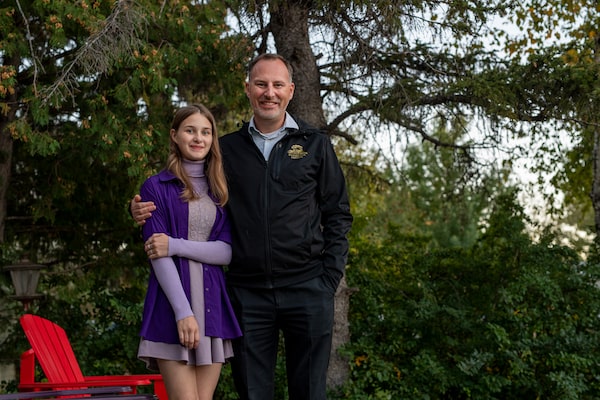
Lang McGilp enrolled his child Eifa at Roadways Literacy Academy, which is specifically designed to help students struggling with learning disabilities ranging from dyslexia to dysgraphia and attention deficit hyperactivity disorder.Liam Richards
When the pandemic hit in 2020, many parents watched with concern as their children struggled with online learning. But for Lang McGilp in Saskatoon, the time brought into sharp focus exactly how much his child, Eifa, was struggling.
Already diagnosed with dysgraphia – a neurological disorder that interferes with handwriting and cognition – Eifa, who uses gender neutral pronouns, received support through the public school for the learning disability, but it just wasn’t enough.
“We realized how far behind they were and how challenging it was to not only focus, but even just write simple sentences for an essay,” Mr. McGilp says.
Knowing he and his wife weren’t equipped to tutor Eifa, they spoke to other parents and found out about a new private school in Saskatoon: Roadways Literacy Academy. The small school is specifically designed to help students struggling with learning disabilities ranging from dyslexia to dysgraphia and attention deficit hyperactivity disorder (ADHD). After a few months of tutoring at Roadways, the family decided to go all in and enroll Eifa full-time.
The results? Life-changing.
After two years at Roadways, Eifa is now ready to be back in the public school system. For the first time in years, they’re not only feeling comfortable with the work, but actually excited to go to a large high school this year. Confidence is back, mood is better and they’re interacting with other kids. On the first day of school, Eifa left the house early.
“I couldn’t believe it. This is a kid that normally was so hard to get out of bed,” Mr. McGilp says. “I think so much of that was from Roadways. It put them in the position to be successful.”
Sheila Erickson, a veteran Saskatoon educator, beams as she listens to Mr. McGilp tell his story. Ms. Erickson started Roadways with one young boy eight years ago and has since had to move locations twice to accommodate the growing school. As a former public-school teacher, she knows how difficult it is to get the support and resources needed through the public system. But private schools like hers do things differently. Students with learning disabilities often need more review time. Small class sizes are the norm for these special needs schools, too, and there’s focus on short- and long-term memory building.
“They learn in a different way, so we have to teach in a different way,” Ms. Erickson says.
That doesn’t necessarily mean offering more accommodations, like hiring an education assistant to read to a child who struggles with reading or getting assisted technology to type what students say. Edward Scully, president of The Laureate Academy in Winnipeg, says that while accommodations keep students from feeling frustrated, they don’t fix the underlying issues. Instead, his school uses a phonological-based reading program – and plenty of practice – to get results.
“Our focus is much more on teaching students how to learn to read,” he says.
Gabrielle Young, an associate professor at Memorial University of Newfoundland in the faculty of education who specializes in special education, agrees that proper interventions are vitally important. Her research shows students with learning disabilities who are given about 200 minutes of reading instruction each week over a two-year period make marked gains. Other research indicates kids who get ample, targeted reading support can become exceptional students in the top 85th percentile, even if they were struggling before.
“Early intervention is very effective,” she says.
Ottawa mom Nancy Schruder now wishes she could have found help sooner for her 14-year-old son, Toby Zorn. Struggling with three different learning disabilities plus ADHD, she calls his experience in traditional school “a nightmare.” Falling through the cracks at school, she worried he would never get an education and would suffer long-term consequences.
Fortunately, after nine months on a waiting list for Heritage Academy, a school designed for students with language-based difficulties in Ottawa, Toby finally got in.
“My gosh, it’s a night-and-day difference,” says Ms. Schruder, pointing out Toby regularly gets B+ or A marks now, up from the C- grades before. He’s also starting to make friends. “The cost is there, but it’s worth every cent.”
While these types of specialized schools can be pricey – often running $18,000 to $21,000 a year – Heritage Academy puts less pressure on families’ wallets. Cheryl Ward, the school’s director and principal, explains the school is run as a not-for-profit, which is rare in Canada. And while the $15,400 to $17,200 annual fee may still be out of reach for some, it’s important to remember the school’s goal is to help students transition back to the public system. On average, students stay for three or four years.
Ms. Ward knows how important schools like hers can be. Diagnosed with dyslexia herself in the 1980s, she remembers doing hours of homework each night just to stay afloat. Her mother, Louise Brazeau, founded the school in 1989 and today there are 150 students, with plans for expansion.
“I think kids are surprised when they hear their principal is dyslexic as well. Because for them, the hope for the future may not be so clear,” she says, likening their work to training as an athlete. Practice gets results. “Students are consistently showing that with the right tools and strategies, they can excel.”
But academics is only part of the equation. Many specialized private schools offer social opportunities, too. At Heritage there are field trips, clubs, camping outings, graduation ceremonies and even prom. Even though students are at a small school, they still get to experience the same rites of passage as their peers.
“Every Grade 12 student deserves a prom,” Ms. Ward says. “Especially a student who has worked even harder to reach that milestone.”